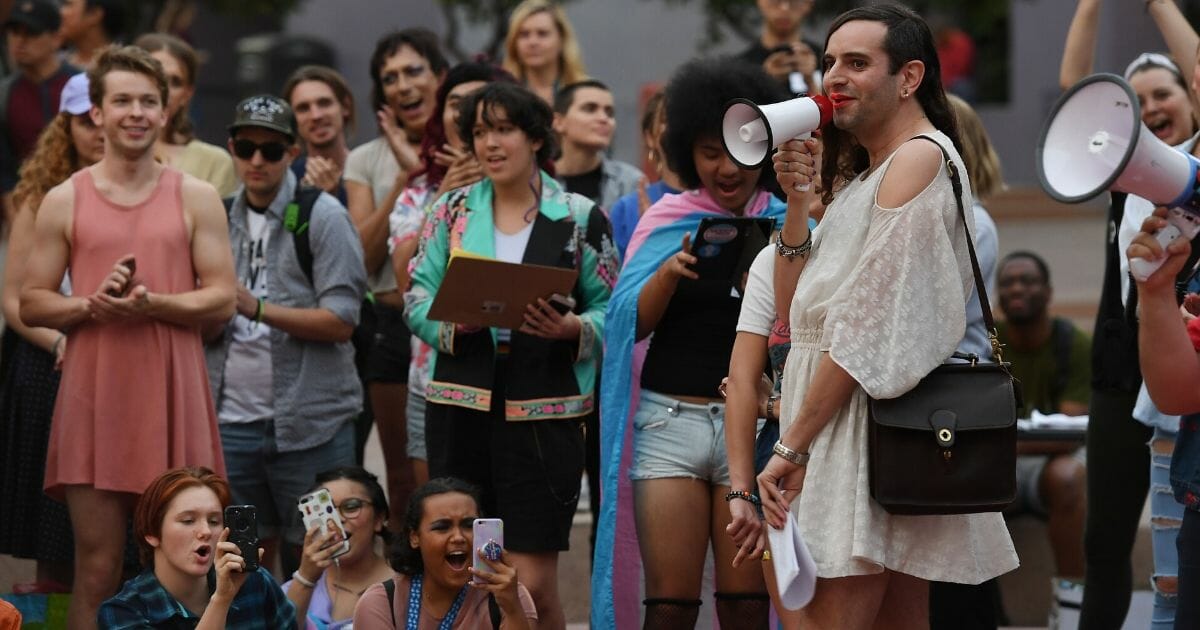
You can get yourself into an awful lot of trouble these days for the mere act of living in reality. Such is the case of Judge Stuart Kyle Duncan, a member of the U.S. Court of Appeals for the Fifth Circuit.
Duncan is a Trump appointee, one who was savaged by the left during his confirmation hearings because they said he couldn’t rule fairly in cases involving LGBT individuals, in large part due to the fact he once represented a school board fighting against a transgender student who wanted to use the bathroom of their choice.
He finds himself again at the center of a controversy regarding whether transgender identity and pronouns are a right in the legal system as opposed to a courtesy.
In an advisory opinion Wednesday, as The Hill reported, Duncan said that it was “convention,” not “binding precedent,” for the courts to refer to a transgender-identifying litigant by their chosen gender pronouns.
The case involves Kathrine Nicole Jett, a transgender biological male.
TRENDING: Northam Declares ‘State of Emergency’ as Militias Prepare To March on Richmond
Jett, back in 2012, pleaded guilty to child pornography charges when he was legally known as Norman Varner.
Jett wanted the court records updated to reflect the fact he had a different name. He also wanted all gender pronouns in the paperwork to be changed to “she/her.”
A lower court ruled that Jett had no claim given that there was no “defect” in the original paperwork, considering that he was legally referred to as Norman Varner at the time of the crimes.
In his majority opinion, Duncan called Jett’s efforts to have his gender pronouns changed in court records a “quixotic undertaking.”
Do you agree with this judge’s ruling?
0% (0 Votes)
0% (0 Votes)
“No authority supports the proposition that we may require litigants, judges, court personnel, or anyone else to refer to gender-dysphoric litigants with pronouns matching their subjective gender identity,” Duncan’s opinion read.
“But the courts that have followed this ‘convention,’” he added, “have done so purely as a courtesy to parties.”
“None has adopted the practice as a matter of binding precedent, and none has purported to obligate litigants or others to follow the practice.”
Congressional legislation regarding “gender identity discrimination,” he said, didn’t apply inasmuch as Congress “has said nothing to prohibit courts from referring to litigants according to their biological sex, rather than according to their subjective gender identity.”
The outrage circus immediately came to town, as evidenced by this purportedly straight news piece from NBC News.
RELATED: Transgender Activist Caught on Camera Allegedly Assaulting Reporter Over a Simple Question
“In his majority opinion, Duncan vacated the lower court ruling that denied Jett’s appeal, saying the court lacked jurisdiction, but then he proceeded to mock Jett’s court motion that she be referred to using female pronouns and her new name,” the Friday article by Tim Fitzsimons read.
Fitzsimons argued that the 5th Circuit had mostly gone with using an individual’s preferred pronouns, although Duncan’s ruling cited three cases in which they didn’t. There’s also no explanation about how this constitutes mocking other than the fact that Duncan said something which went against liberal transgender dogma.
The remainder of the piece seemed to be handed over to Duncan’s adversaries from his confirmation to the court.
“The idea that Mr. Duncan will cast aside his bigoted beliefs overnight, and miraculously transform into an impartial judge, is ludicrous and reckless,” Lambda Legal Executive Director Rachel Tiven is quoted as saying back in 2018.
American Civil Liberties Union attorney and transgender rights advocate Chase Strangio said Duncan’s ruling was “far outside the standard practice within the entire legal profession” and that he went “on this long advisory opinion about the legal implications of pronouns and the nature of sex discrimination and things that have nothing to do with the case or the question before it.”
Almost as much column space, meanwhile, was given over to the dissenting opinion from Clinton appointee Judge James L. Dennis.
A short excerpt: “As the majority notes, though no law compels granting or denying such a request, many courts and judges adhere to such requests out of respect for the litigant’s dignity,” he wrote.
“[O]ut of respect,” however, isn’t a binding thing.
It’s a matter of courtesy, and it’s nothing that the court has an obligation to rule on, particularly in a case such as this.
While much of what Duncan had to say may be a novelty for a media outlet like NBC, his ruling is both legally sound and should be a welcome guide on an emerging set of rules involving how courts and law enforcement should deal with transgender-adjacent issues.
No one, especially not our court system, ought to be forced to change their language based on one person’s demands.
Going into 2020, it’s well worth reminding voters that control over judicial appointments is going to be one of the key factors in the battle for the White House.
It’s difficult to imagine what the landscape would look like were Hillary Clinton president.
Of course, say what you will about Clinton, but 2016 Hillary sounds an awful lot more reasonable than 2020 Joe Biden or Elizabeth Warren.
Consider what this decision would be like without a Trump appointee — and then think about what might happen if the Democrats are allowed to nominate federal judges for the next 4 years.
We are committed to truth and accuracy in all of our journalism. Read our editorial standards.
via The Western Journal
Enjoy this article? Read the full version at the authors website: https://www.westernjournal.com
